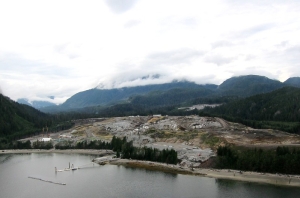Clean Energy Canada | B.C.’s late LNG bet appears risky in a competitive market
March 25, 2024

B.C.’s nascent LNG industry evokes strong opinions from all sides. While perhaps the one thing everyone can agree on is that Canada is late to the LNG party, on everything else, common ground is elusive.
LNG may have looked like a viable path for B.C. a decade ago, but this isn’t necessarily the case today. In fact, B.C. LNG looks more and more like a bet, and perhaps more than any other in recent provincial memory, it is a bet with big costs and big risks. LNG is a bet on one vision for our economy over another. It’s a bet on a particularly draining use of our electricity system over other priorities in need of power. And it’s a bet on our climate.
Many of B.C.’s proposed LNG projects would come online in a global LNG market anticipated to see export capacity increase by 43 per cent by 2030, but there is no consensus from governments or industry on future global demand. Japan’s LNG imports, for one, have steadily declined over the last decade and fallen to their lowest level in 14 years as the country restarts nuclear power plants and builds out renewables.
Adding further uncertainty to B.C.’s LNG industry is the question of where the electricity will come from to power new projects. If the federal and provincial governments live up to their climate commitments (namely on methane reduction, industrial carbon pricing, an emissions cap and ensuring that new LNG projects reach net zero on scope 1 and 2 emissions), over eight Site C’s worth of additional electricity would be required to electrify the six LNG projects in B.C. currently proposed or under construction.
In the past, the province would look to its neighbours to import power, but they are also experiencing electricity shortfalls. Importing one Site C’s worth of power costs $600 million based on last year’s average daily market rate, meaning that if the province can’t generate enough power to support LNG, the ratepayer or taxpayer will need to make up the difference.
Put another way, that’s a considerable annual bill that will be put to B.C. ratepayers or potentially taxpayers. LNG is a risk for household affordability, too, if B.C. families pay more for electricity and natural gas as the LNG industry drives up the price of both.
If the twin headwinds of oversupply and insufficient electricity weren’t difficult enough to overcome—assuming they can be overcome—a larger issue looms heavily over the LNG debate.
When accounting for the full life-cycle emissions of LNG, numerous studies show that it is far from clear whether LNG exports can lead to a reduction in global emissions, with estimates varying widely. Key uncertainties include levels of methane leakage and venting along the supply chain, assumptions around the global warming potential of methane, emissions from shipping the LNG to its destination, and the extent to which LNG replaces more polluting energy sources versus clean energy.
Additionally, there is a risk that LNG crowds out public and private sector investments in renewable energy and locks in infrastructure that is incompatible with a net-zero future. In fact, the International Energy Agency finds no need for investment in new fossil fuel supply in a world that achieves net zero by 2050.
Indeed, when understood as a choice between diverging pathways, LNG finds one more majority consensus. More British Columbians than ever now say they would prefer the government focus on developing renewables (69 per cent) over LNG (15 per cent) in comparison to responses to this question from 2022 (64 per cent for renewables) and 2020 (61 per cent).
When online poll respondents last month were presented with a number of emerging economic development opportunities, renewable electricity was most popular (84 per cent), followed by manufacturing clean technologies (80 per cent), clean hydrogen (75 per cent) and sustainably produced metals and minerals (67 per cent). Natural gas production (48 per cent) and exporting LNG (39 per cent) were the least popular options presented.
As for whether B.C. LNG projects should receive government support to cover the cost of electrifying their operations to reduce emissions, a significant majority (65 per cent) said they believe companies should bear this cost without taxpayer dollars, compared to just 15 per cent who support this use of public funds.
Ultimately, LNG is a bet with many risks and many costs, and the market—not the taxpayer—should bear the financial risks.
This post first appeared in Business in Vancouver.